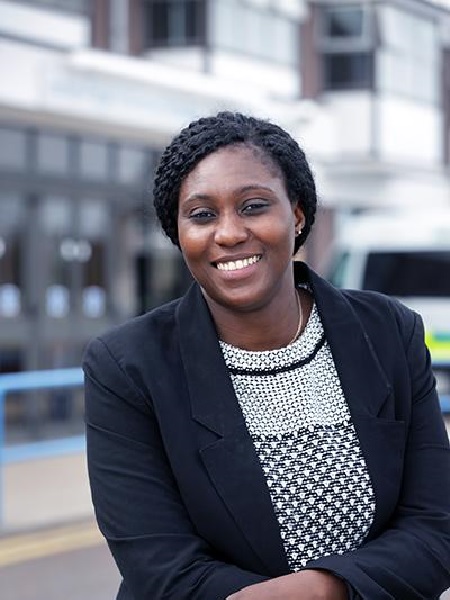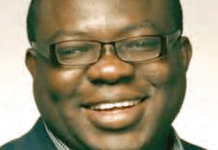
The narrative of Dr Gloria Olubusola Rowland’s emergence as one of the most illustrious nurse leaders in the United Kingdom is one that is both intriguing and inspiring. Despite her humble background and training in Saki, Oyo State, Nigeria, she has consistently distinguished herself as a transformational nurse leader and visionary.
She is presently the Chief Nursing Officer and Executive Director of quality for the entire North West London. Before then, she was the director of midwifery at Barts Health NHS Trust, which has the largest maternity services in the UK. That post was an iconic one for Rowland, as it established her as the first Black African director of midwifery in the history of maternity services in the UK.
The UK’s Nursing Times in describing her, says: “Dr Rowland has received national recognition for her work in transforming maternity care including chairing the trailblazer group that developed the new apprenticeship pathway into the midwifery profession.” The Nursing and Midwifery Council of UK concurs, saying: “She has a strong passion for change, innovation and transformation of health services.”
Significant beginnings
Growing up in her rural community in Oyo State, Rowland’s initial intention was to study Medicine. However, when she attempted the entrance examination (Unified Tertiary Matriculation Examination) the first time, she was offered Physiotherapy. She rejected the offer and decided to write the examination the following year.
Fortunately however, her mother, who was also a prominent health professional, encouraged her to enrol for the Nursing programme at the Baptist School of Nursing in Saki. The plan was for her to have some basic knowledge of key areas in the medical sciences, such as Anatomy and Physiology, while preparing to take another UTME. However, once she began her training, it dawned on her that Nursing was what she was born to do and she decided to complete the programme.
Signs that Rowland was going to be an exceptional nurse began to manifest, soon after she graduated from the nursing school. Having been trained to “nurse from the heart”, she approached her practice with unusual commitment and sense of duty. She found herself being drawn to patients that many other nurses would not be comfortable attending to. For example, there were nomadic herdsmen in the bushes and forests surrounding the village in which she practised, some of whom had very poor hygiene habits. When such visited the clinic, many nurses tried to avoid them but she always wanted them for herself.
Rowland however faced a major challenge that increasingly diminished her zest for the profession she had come to love. Nurses were often considered inferior and treated as servants by the physicians. According to her, “I enjoyed the training. But when I started working, the things I saw and how nurses were treated – you had to give water to the doctors, kneel for the doctors, and in the theatre, you had to wipe their faces while sweating – I didn’t like that. I knew that was not what I wanted to do.”
With her dissatisfaction mounting, Rowland began to seek a means of escape from what she had come to consider a stifling work environment. Moreover, having been given a horrible first impression about nursing practice, she decided that she would return to the medical field to do her further studies.
Greener pastures
Rowland’s much-awaited moment of “escape” came when she won a scholarship to study Medical Law in the UK. As Providence would have it however she spent her first few days with a family in the UK, in preparation for her resumption. The family convinced her that since she already had a background in Nursing, it was better for her to continue. The argument was that the prospect of getting immediate employment after graduation was very high and her student visa gave allowance for switching her intended course of study.
Rowland made the smart decision of personally researching how nursing practice was being done in the UK and much to her surprise and relief, the setting was totally different. She thereafter proceeded for her adaptation programme which qualified her to be a registered nurse. Soon after obtaining her B.Sc Nursing and Midwifery, she bagged a master’s degree in Public Health from Brunel University, London, and subsequently did her Doctorate in Clinical Practice at the University of Southampton. Essentially, within the space of a few years, she had qualified as a midwife, specialist community public health nurse, and doctor of clinical practice.
Impactful career
Given her solid background, robust professional training and natural passion for excellence, it is no surprise that Rowland’s years in service as a nurse leader have been garlanded with notable accomplishments. Having demonstrated broad expertise and meritoriously risen through the ranks of the leadership of the UK’s health system, she was made director for Midwifery at Bart’s Health NHS Trust in 2018.
Despite the upsurge in her responsibilities as the head of the UK’s largest maternity service, Rowland wasted no time in bringing to bear the transformational approach to nursing leadership that had become her trademark over the years. Indeed, just two years into her appointment, Bart’s Health NHS Trust reported that she had “made considerable improvements to our maternity services and was recognised by CQC Chief Inspector Ted Baker for ‘outstanding practice in the leadership and drive shown.’”
As is common with exceptionally productive people, the turbulence that characterised year 2000 proved to be a catalyst for even greater accomplishments for Rowland. Naturally, with the outbreak of COVID-19, the celebrated nurse leader had more challenges to contend with, with higher numbers of women and expectant mothers falling ill. Even more, she observed that the pandemic was affecting a disproportionate number of people from Black and minority ethnic communities, including her nursing colleagues.
However, rather being daunted by these unforeseen challenges, she rose to the occasion and confronted them headlong with unprecedented initiatives, some of which have continued to yield results even after the pandemic. One of such lasting initiatives is the Turning The Tide Project.
The project had emerged from her discussions with several of the heads of maternity in the UK, who she ultimately led to compile a report highlighting the historic and endemic inequalities faced by Black and Asian healthcare professionals in the NHS, and those of mixed ethnicity. Findings of the report were shared with the concerned regulatory authorities. In response to the findings and recommendations, the Royal College of Nursing recently launched a new mentoring scheme to support Black, Asian, and minority ethnic midwives and maternity support workers (MSWs) in their career development.
Recognitions and awards
In celebration of her immense contributions to the advancement of nursing practice and healthcare delivery, Dr Rowland has won several honours and recognitions. In 2021, Her Majesty, Queen Elizabeth II, awarded her an MBE, one of UK’s most prestigious awards. Earlier in 2020, she was appointed to the National Advisor Group of the UK’s Chief Nursing Officer, so she could use her wealth of experience in helping to provide an effective response to the COVID-19 outbreak. Additionally, she was made a Florence Nightingale Research Scholar in 2011 and a Mary Seacole Scholar, two years earlier (2009).










